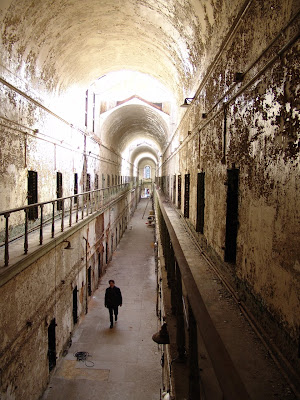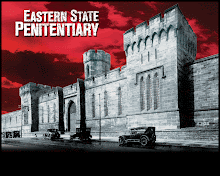- Erica, Admin and Collections Assistant
Year after year a special group returns to Eastern State Penitentiary to enjoy some food, a little new gossip, and a lot of stories of “the old days.” At the Alumni Reunion on May 22, groups of former inmates, guards, staff, and their families once again gathered to share their memories of the building with one another and with visitors.
Like our visitors, I’m often surprised that so many “alumni” choose to return to the penitentiary. On first thought, the penitentiary seems to be an entirely negative space: the scene of many violent acts, a place away from family and friends, where even the staff were locked inside until their time (shift) was up. More than one person has confessed that just being back inside the building makes them feel uncomfortable: as if they feel a repressed panic that they will be once again confined within its impenetrable walls.
However, for many, their time living and working at the penitentiary comprised a large portion of their lives. “The old days” weren’t always good, but they were meaningfully sprinkled with acts of kindness and respect. Many of the friendships formed here lasted for decades and a chance to see one another again is welcome. Others return because it’s a chance to explain part of their life experience to their loved ones. Some might return because they feel a duty to tell the public what prison is really like and how it doesn’t compare to a life on the outside.
I was disappointed when the persistent rain showers worsened and the public question and answer session with the alumni was cut short. I hope that next year will afford another chance to share this event with our visitors and the men and women who lived the history of Eastern State.
Friday, May 28, 2010
Thursday, May 20, 2010
Sorrows, Smiles & Mythical Beasts
- Kate
In the courtyard between Cellblocks 3 and 4, we glimpse a grinning face in the stonewall mortar. An inmate laborer working on the wall was compelled to add this flourish along with the year (1938) and his initials (CK, not pictured). We believe this prisoner may have been Clarence Klinedinst, a skilled stonemason. His other contributions to the site include a 97-foot underground escape tunnel from his cell out to Fairmount Avenue!
Finally, compare these two Pennsylvania state seals, both embedded in the walls of the intake room (now historic site staff offices):
Notice anything odd about the one on the right? Yes—instead of horses, the seal has UNICORNS! Even in a desolate prison ruin, a bit of whimsy survives. Amazing!
Eastern State Penitentiary held tens of thousands of inmates and employed hundreds of workers over its 142-year history. Did these men and women leave any personal trace? Yes! Some made physical marks on the building itself—small, enigmatic reminders of life behind the walls.
Guards often permitted prisoners to paint their own cells. (When Charles Dickens visited Eastern State in 1842, he observed that one inmate “had painted [his cell] walls and ceiling quite beautifully.”) In Cellblock 8, a layer of institutional green and white paint has chipped away to reveal an eye with a teardrop over a cell door. In addition, the prisoner painted one wall with a wood grain pattern to resemble paneling.
In the courtyard between Cellblocks 3 and 4, we glimpse a grinning face in the stonewall mortar. An inmate laborer working on the wall was compelled to add this flourish along with the year (1938) and his initials (CK, not pictured). We believe this prisoner may have been Clarence Klinedinst, a skilled stonemason. His other contributions to the site include a 97-foot underground escape tunnel from his cell out to Fairmount Avenue!
Finally, compare these two Pennsylvania state seals, both embedded in the walls of the intake room (now historic site staff offices):
Notice anything odd about the one on the right? Yes—instead of horses, the seal has UNICORNS! Even in a desolate prison ruin, a bit of whimsy survives. Amazing!
Thursday, May 13, 2010
Cellblock 7
- Alaina
John Haviland: internationally renowned 19th-century architect. Mastermind of the most influential prison ever built. Enduring show-off.
I can’t help but think it when I walk down Cellblock 7, completed in 1836 and recently re-opened for 2010 after a year of vital plaster repairs.
Cellblocks 4 through 6 have second-story cells directly flush with those under. A plain, practical iron walkway juts from each side of the second floor. But Seven’s second-story cells are set back from the first floor, making a comfortable walkway with a real floor. Flower-sculpted cast-iron railing posts make a strikingly elegant balustrade (Haviland personally owned the design for these balusters) which embellishes the beautiful, ingeniously fitted iron staircases. Seven is ESP’s longest, widest block, and it has a lofty, majestic, sunlit peace.
But who was it all for? Was it meant to underscore the civil and spiritual ideals of the first penitentiary? If so, when did the inmates, locked in their cells, get to contemplate it? Was this grandeur meant to inspire the guards or impress outside dignitaries and journalists?
Or perhaps, in designing this monument to not only the problems of civilization but also to a human, social and spiritual ideal, Haviland could not help indulging his taste for beauty – despite a prison’s grim daily function. If I had Haviland’s talent and notoriety, would I resist such splendid flourishes?
Maybe I like Cellblock 7 so much because Haviland really designed it to wow me and you and everyone else who will ever see it. He might have been a bit of a show-off – but I’m not complaining.
Friday, May 7, 2010
Locked Gates
- Alaina
“Why are you locking that gate behind us?” It’s a question I get a lot. Sometimes, what with all the gates that must be opened and closed, unlocked and locked (“hey, what’s in there??”) as we tour guides move through the building and lead our groups, it might seem like ESP’s staff still wants to keep anyone from escaping. Despite the fact that ESP (though I say it myself) is the coolest historic attraction in Philly nowadays, back when most of the prison was built in the early 1800’s, no-one had any idea it would become a popular 21st century museum. Now, we have to adapt ESP to its new purpose.
“But why can’t I stroll wherever I want?” visitors wonder. Well, in a 180-year-old building, safety is paramount. Even staffers can’t enter some areas of ESP, because of the dangerous deterioration. This dilapidation is part of the prison’s irresistibly authentic aura – but also the biggest challenge of inviting folks inside. The best way to make sure everyone is safe is to keep track of where everyone is, and that’s why I lock the gate behind us.
But those who have been to ESP know that you need a few hours to take in all the places you can wander. The fact is, a few locked gates are really what allow us to keep so many spaces open. And although a few cell blocks are closed, you still have a great view of their haunting, deserted corridors – making for some of the best photo ops in the city. Our stabilization and restoration work is always going on, and this year, new tour spaces include the TowerCam exhibit and Cellblock 14’s underground “Klondike.” So every season, I’ll be unlocking a few more gates for you.
“Why are you locking that gate behind us?” It’s a question I get a lot. Sometimes, what with all the gates that must be opened and closed, unlocked and locked (“hey, what’s in there??”) as we tour guides move through the building and lead our groups, it might seem like ESP’s staff still wants to keep anyone from escaping. Despite the fact that ESP (though I say it myself) is the coolest historic attraction in Philly nowadays, back when most of the prison was built in the early 1800’s, no-one had any idea it would become a popular 21st century museum. Now, we have to adapt ESP to its new purpose.
“But why can’t I stroll wherever I want?” visitors wonder. Well, in a 180-year-old building, safety is paramount. Even staffers can’t enter some areas of ESP, because of the dangerous deterioration. This dilapidation is part of the prison’s irresistibly authentic aura – but also the biggest challenge of inviting folks inside. The best way to make sure everyone is safe is to keep track of where everyone is, and that’s why I lock the gate behind us.
But those who have been to ESP know that you need a few hours to take in all the places you can wander. The fact is, a few locked gates are really what allow us to keep so many spaces open. And although a few cell blocks are closed, you still have a great view of their haunting, deserted corridors – making for some of the best photo ops in the city. Our stabilization and restoration work is always going on, and this year, new tour spaces include the TowerCam exhibit and Cellblock 14’s underground “Klondike.” So every season, I’ll be unlocking a few more gates for you.
Wednesday, May 5, 2010
Check out our cool new video!
We've created a cool new video with eerie and beautiful images of the prison and our new 2010 programming. It also has a funky soundtrack by jazz composer Vijay Iyer.
Check it out and see below on how you can help us spread the word...
We'd love for you to embed this video on your individual Facebook pages, link to it from Twitter, etc. When you post it, please suggest that anyone watching it should also repost it. We've set a goal to reach 10,000 views within a week - help us get there!
Subscribe to:
Posts (Atom)





.jpg)
